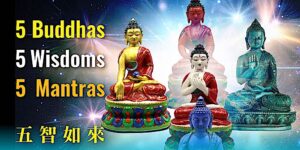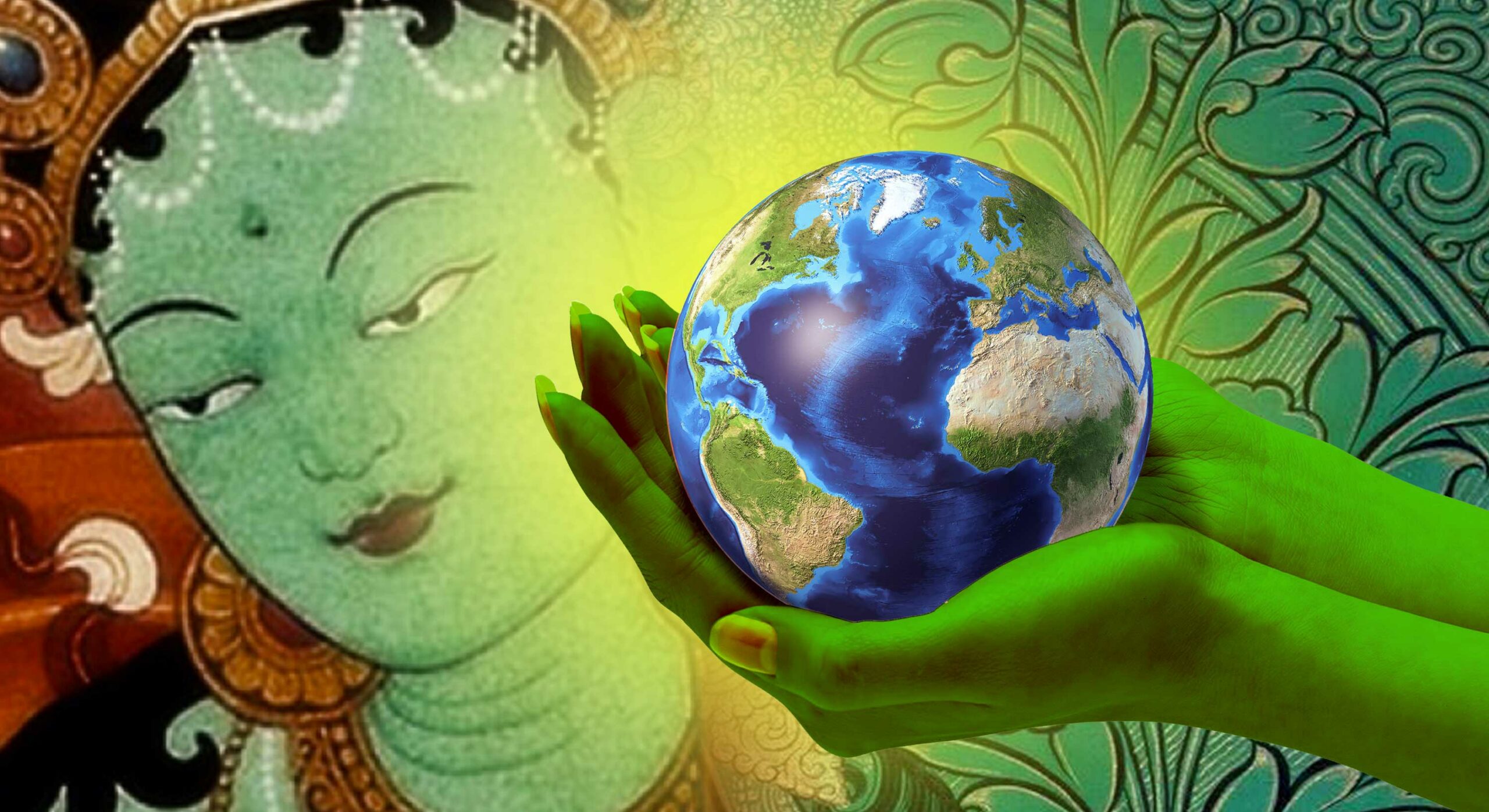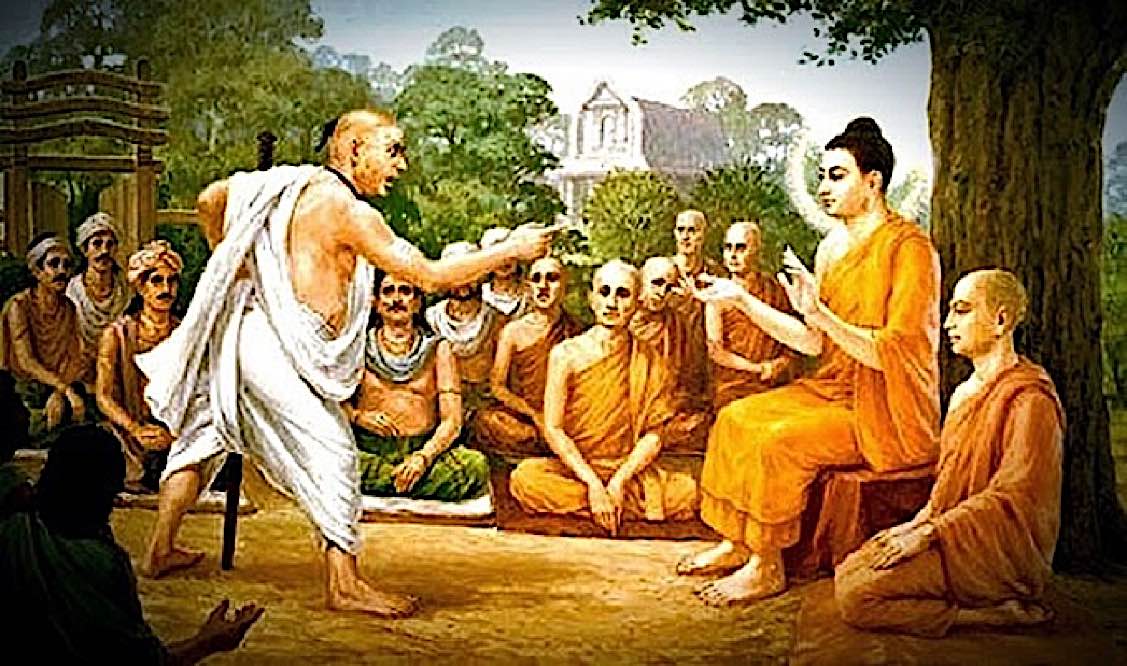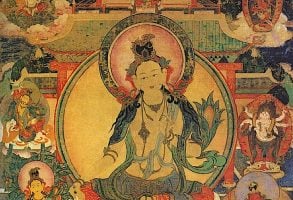Dog and Cat Dharma: Did Buddha Teach That Dogs and Cats Have Buddha Nature? How Can You Help Your Companion Meet the Dharma in Daily Life?
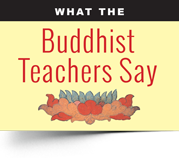
I saw a sparkling moment of real Doggy Dharma last weekend. At a Medicine Buddha retreat, a nice couple brought along their beloved 15 month-old pup. My kind teacher, Zasep Tulku Rinpoche, smiled as they lifted the pup for a blessing after the teachings. I had brought along my bell and vajra for blessing. Others, their mala. I didn’t even think of bringing my doggie companion!
After the final blessings, Rinpoche played with this cute little dog on the floor and hugging him in his arms. The smiles on both of their faces conveyed real-life Dharma in practice.
From a Buddhist point of view, dogs, cats, companion animals — in fact all animals and sentient life — are equally precious. According to Buddha Dharma, all sentient beings also have Buddha Nature — the potential to eventually become enlightened.
Theodore Tsaousidis, a teacher with Medicine Buddha Toronto, said, “If we accept that all beings have Buddha nature, then the greatest goal in life is to see our true nature and then help others to also realize their true nature.” [5]
My Own Experience with Doggie Dharma
Dog companions have always been a part of my life — together with cats and horses. From my own experience, I notice remarkable changes in behavior and attention around all of my companions when I chant Tara or Medicine Buddha mantras. I have nursed many of my companions through sickness and old age, and ultimate passing — my two beautiful Dalmations DJ and Portia at the ripe ages of 16 and 17, true Dharma dogs who would sit by the altar when I practiced.
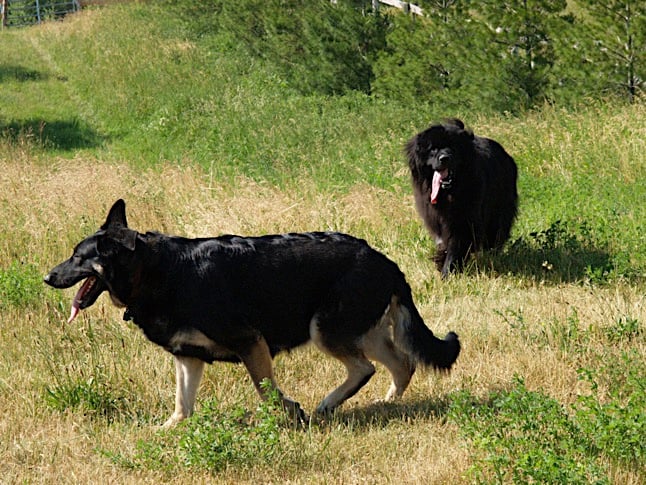
Years later, my beautiful Newfoundland, Polo, exemplified the Buddha Nature in dogs. He was a gentle giant, the size of a miniature horse, with a massive jaw and teeth — but so gentle I’d trust a toddler with him, even one prone to pulling tails. He literally grinned wherever he went. There was never a moment of sadness in those alert almost-human eyes. He was so happy and fulfilled in his life, living on the farm with the horses and cats with his “sister” Toffee (German Shepherd). All-day long, he’d sit by my side as I typed, craving attention, a happy walk, and listening to my mantras. If I didn’t let him in the meditation room (usually I would) he’d patiently wait outside the door and listen to the mantras. After he passed, as I do with my closest companions, I mourned for 49 days in the traditional style, dedicating the merit to his auspicious human rebirth or rebirth in Amitabha’s Pure Land.
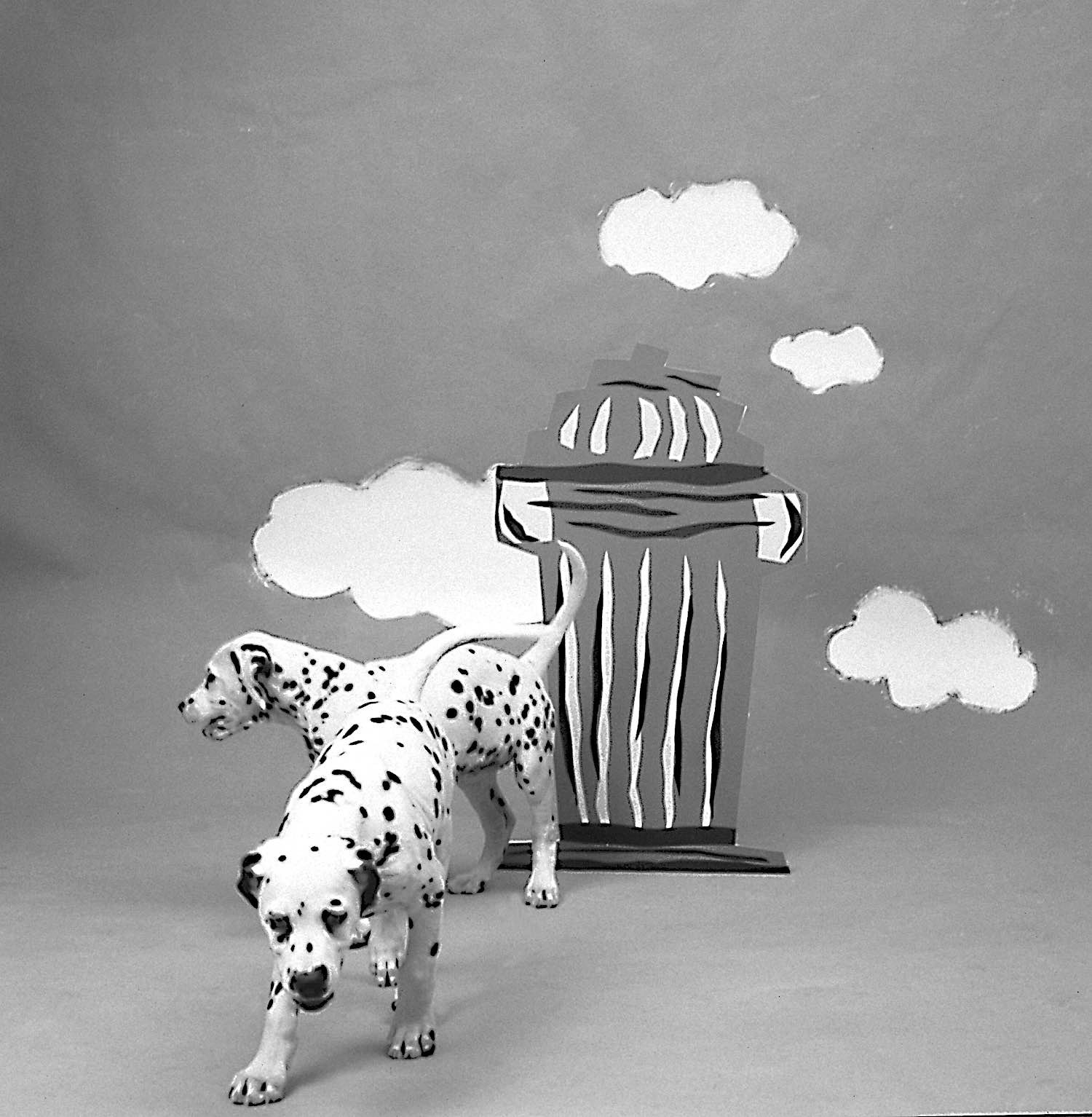
I have no doubts that they participated in my Dharma practice. They were fully at attention, watching with alert eyes, as I did my practices.
What do I say about the cats? They jump up on the altar, knock things over, but they always hover around and tune in to the practice, usually falling asleep halfway through — or are they meditating?
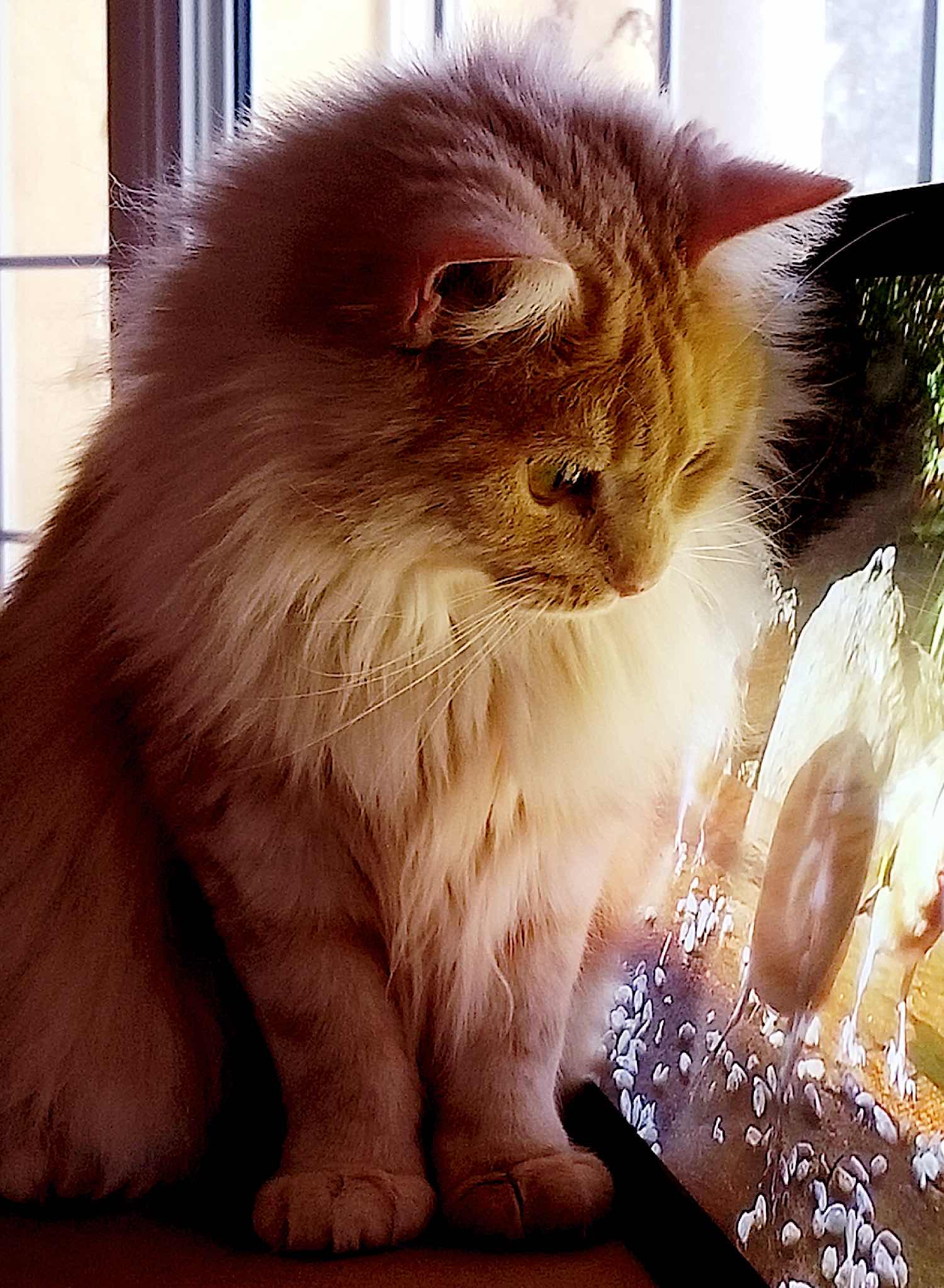
Lama Zopa Rinpoche: “The Teaching to 500 Swans”
Lama Zopa Rinpoche, in a teaching on “animals in everyday life” wrote: “There is a story when Buddha gave teachings to 500 swans in the field and the next life they were born as human beings, became monks, and they all became Arya beings, able to achieve the cessation of suffering and the true path. So the result is unbelievable, just by hearing Dharma words.” This teaching illustrates that all animals have Buddha Nature. The swans, in just one life cycle, became humans, monks, and ultimately Aryas.
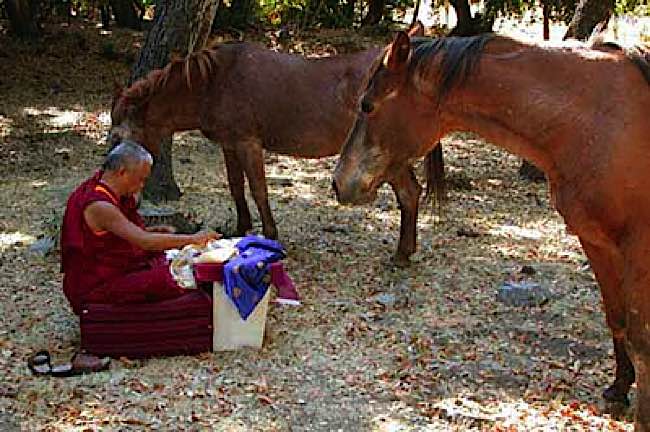
Lama Zopa Rinpoche continued: “Vasubandhu was reciting the Abhidharmakosha and a pigeon on the roof heard this everyday. One day the pigeon died and Vasubandhu checked to see where he was born. It was in a family who lived down below in the valley. He went down and saw the child and asked if he could have him and the family gave him to Vasubandhu. The child became a monk named Lobpön Loden and became an expert on the text that he had heard when he was a pigeon. He wrote four commentaries on that text. Therefore, it’s extremely important to recite lam-rim prayers and mantras — at least the mantras — to animals.”
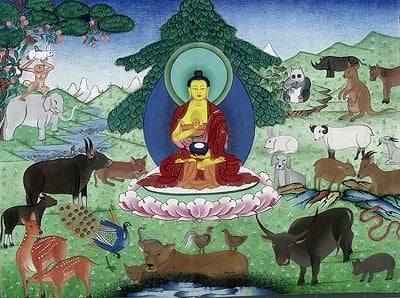
Bring our animal companions into our meditations?
Most Buddhists are familiar with these stories. Yet, in real life, do we really treat our animal companions as fellow journeyers on the path to Enlightenment? If we did, we’d bring our pets meditation rooms and retreats (with Teacher’s permission, of course!)— as the nice couple did during last weekend’s Medicine Buddha retreat. We’d acknowledge our companions are subject to Karma, just like us. This means that, as their friends, we need to be mindful of their actions, as much as our own, because they, too, have Buddha Nature. They, like the swans, can become Aryas (Enlightened Beings).
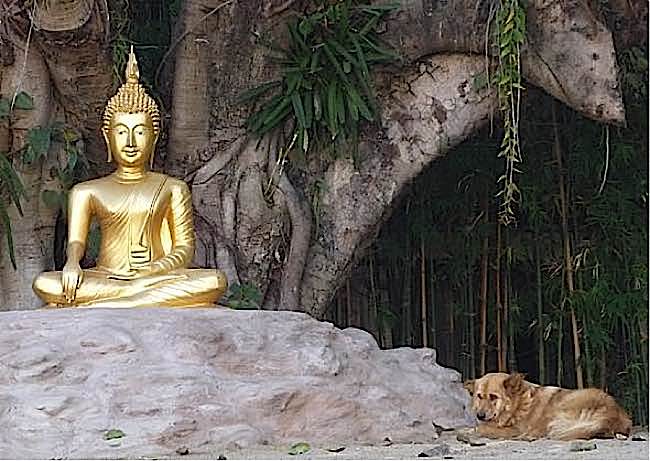
Theodore Tsaousidis explained you have to take responsibility. “If you refuse to be honest about every single choice you make in your 24 hour day, then Buddhism, for you, is just another distraction.” When we take on responsibility for animal companions, we also take on choices that affect them, their development, and their future lives.
Lobsang Dhargey: “recite mantra and pray for animals”
Lobsang Dhargey, resident teacher at the Tibetan Buddhist Centre in Redding advises “recite mantras and pray for the animals.” Not when they are dying, but throughout their lives. At the Centre in Redding, they perform animal blessing ceremonies. “We believe animals are like humans with emotions. Animals can be sad, afraid, worried, wish to be happy…” At the event in 2014, nearly 100 residents brought dogs, cats, horses, turtles, sheep and goats to be blessed. [3]
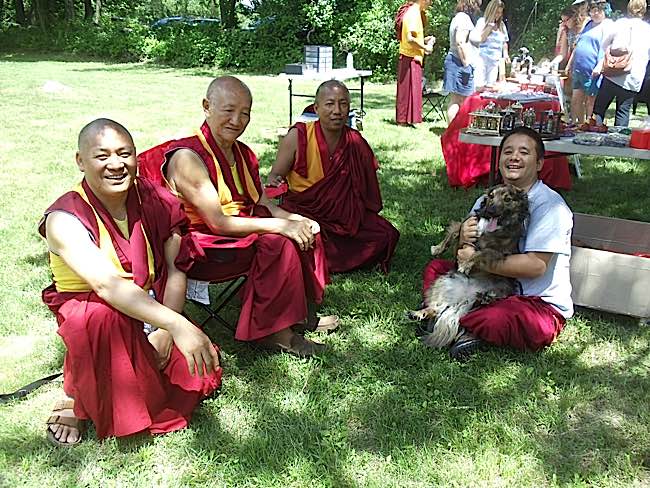
The concept of the blessing is to “make this potential [to be happy] better by blessing the animals… visualize their lives being better.” As they chant mantras and prayers, they plant “a kind of seed that grows in the minds of animals to give them good health and a better life.”
Lama Zopa Rinpoche: practices you can do for animals
Medicine Buddha is well known as a practice for animals. It is taught that Medicine Buddha’s mantra when spoken in a dying animal’s ear, will help release it from lower rebirth, ensuring birth as a human. [Buddha Weekly story on Medicine Buddha here>>]
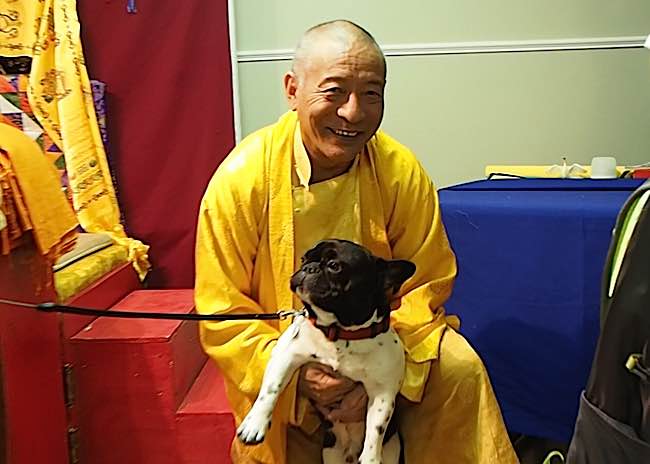
Kyabje Lama Zopa Rinpoche also advises these mantras or practices as beneficial for animals, throughout their lives to help bless their mindstreams:
- Medicine Buddha: Om Bekhandze Bekhandze Maha Bekhandze Bekhandze Randza Samundgate Soha
- Green Tara: Om Tare Tuttare Ture Soha
- Avalokiteshvara (Chenrezig or Guanyin): Om Mani Padme Hum
- Milarepa: Om Ah Guru Hasa Vajra Sarva Siddhi Hum
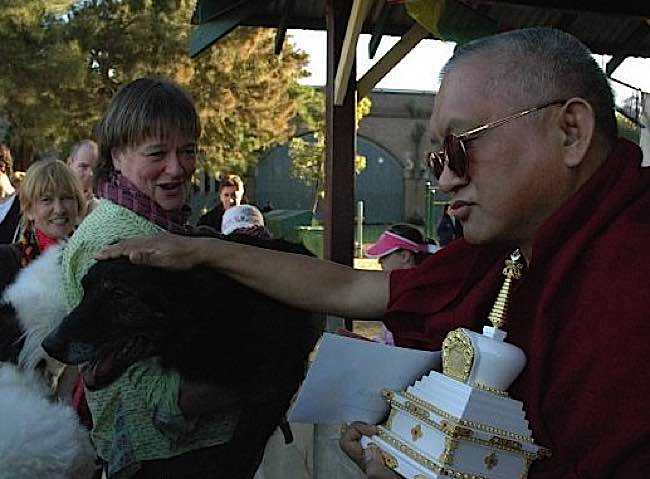
Throughout their every day lives, it is best to consider, or include, your animal companion in your practices. He advises. “Take them around holy objects — circumambulate… Chant mantras…” Recite prayers in their ears to “plant the seed of all the realizations of the path to enlightenment.”
He writes in his popular advice web page: “this makes a huge difference. It has inconceivable result, unbelievable result. That makes them have a good rebirth in the next life, to be born as a human being and meet the Dharma.” He also recommends blessing their food.
Lama Zopa’s advice for sick animals
For sick animals you can recite Medicine Buddha healing mantras over medicine or water and then blow on the liquid before giving to an animal. In the case of a deceased companion, the same mantras are beneficial, chanted at least 21 times, preferably 108, blowing water and visualizing the deity or the deity’s blessing light being absorbed. Then pour the water on the deceased.
For a dying animal, Lama Zopa Rinpoche recommended saying the entire Medicine Buddha sadhana.[5]
Venerable Thubton Chodron: Daily Doggie Dharma — suggestions for daily life
The much respected and loved teacher Venerable Thubten Chodron advised a student named Bob to spend time putting “good karmic imprints on his mindstream…It will establish a connection between him [his dog] and the Three Jewels, so that he will meet the teachings and have an affinity for them in future lives.” [1]
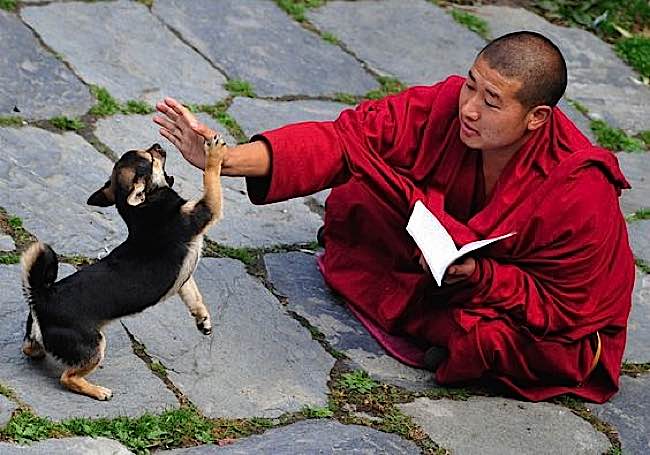
Venerable Chodron also advised: “So read Dharma books or short texts or prayers out loud to him, e.g. the Heart Sutra, The Three Principle Aspects of the Path, The Foundation of All Good Qualities, etc. Say lots of mantra so he hears it.” She was speaking to a student who’s pet was dying, but the advice is best applied much earlier, long before sickness and end of life issues.
Daily Meditation: include an animal companion
Many Buddhists encourage their pets to settle down in a room where they meditate or perform daily sadhanas. Cats, in particular, seem drawn to practice, often snuggling right in the lap of the meditator. Of course, highly precise, advanced tantric practices might not be the best for pets, but for simpler practices — quiet breathing practice, mantra practice or sutra reading — the company is very beneficial.
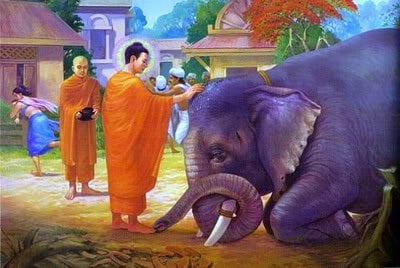
Personally, I’ve found my dog, cats, and horses all respond noticeably to mantras, and I chant them whenever I am with them. When I’m feeding the horses, I’m inevitably chanting the Medicine Buddha mantra, remembering His vow to heal and save all beings, and in particular his vow to help all beings and animals. The teachings say that his mantra, when chanted to animals, sets them on the path to higher birth.
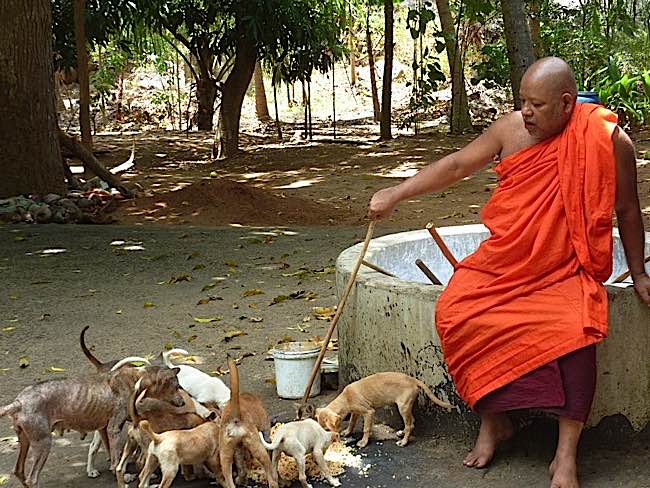
Doggie Dharma at end of your companion’s life
We usually only start thinking of Doggie Dharma when a beloved pet is about to pass away, or has already died. As Buddhists, we often take solace in the doctrine of rebirth at such times. Buddha was clear on this. Animals, like humans, take actions and are subject to karma and rebirth. Therefore, your beloved dog or cat or other animal companions will certainly face rebirth. Our actions as their caregivers also have karmic implications. The time to think about Dharma and a beloved pet’s Karmic well-being is from the first day you adopt — not just when they are sick or dying.
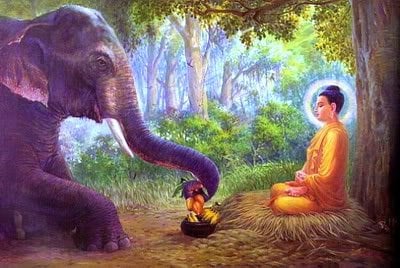
For many animal companion lovers, this is a relief, particularly as their friends typically have shorter lifespans. The idea that their beloved companion will be reborn is a major consolation.
Venerable Thubten Semkye: “pouring the light of their loving compassion…”
In consoling a fellow animal caregiver, Venerable Semkye wrote, “Even though Achala lived his entire life surrounded by the Dharma in a very conducive environment, his ability to practice was non-existent due to his karma of being born as a cat… Prayers, mantra recitations and visualizing the Buddhas and Bodhisattvas pouring the light of their loving compassion and wisdom on him were a very powerful practice.” [1]
Venerable Semkye explained, “Animals are very sensitive to our energies and mind states. So, keeping our hearts soft and open was crucial. We wanted him to feel our love and care, not worry or disturbances.”

If a beloved pet is sick — just as we might for our human family members — make a doctor’s appointment, but also meditate on the Three Jewels, perhaps chant mantras or sutras. We might chant the mantras over our pet’s water, or their medicine prescribed by the vet, then blow on them, just as we would for our children.
Caregiver Karma — we can take on heavy karma
We, as caregivers, inevitably take on the potential for negative karma from the moment we adopt. There’s positive karma, of course, especially if we rescue an animal from the pound or the streets, or take on an elderly or infirmed pet when no one else will. As we care for our loved one, that’s all positive, of course.
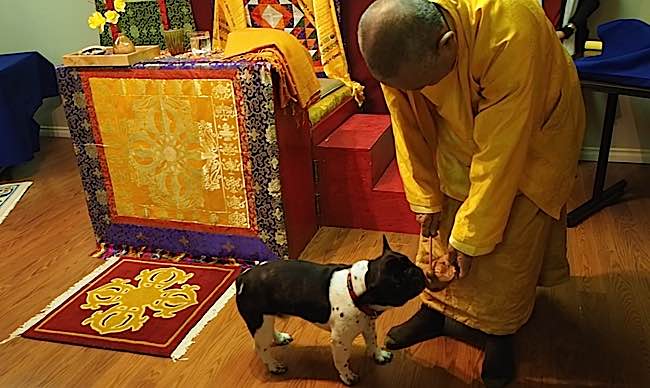
Where does the negative karma arise? If we believe meat derives from killing, the precepts come into play, notably the prohibition from taking life when we buy dog or cat food (See “The Precepts”, below). But, just as with humans, the negative karma may not apply if the killing is not specifically for our benefit. In one sense, as caregiver, we are preventing our companions from killing. If not fed, their natural needs as predators (in the case of cats or dogs) would arise, bringing on negative karmic implications on their mind streams.
As the more “responsible” partner in the relationship, we make decisions for our companions, which restrict their free will. Other negative karmic implications can occur if we spoil our companions; they may become unmanageable or hostile in society. And so on. It’s no different with children. These are all potentially negative karma for us.
Theodore Tsaousidis: “You have a choice as a human not to cause harm.”
Most Buddhists, as compassionate people, tend to love animals. Yet, even if we don’t have that affinity or desire to care take animals, our behavior in daily life still has to reflect our Buddhist compassion and our acceptance of karmic consequences.

Theodore Tsaousidis of Medicine Buddha Toronto said, “If we look at cosmology and mythology in Buddhism, particularly the Jataka Tales, we see beings manifest in various forms: such as spirits, animals, gods and humans. Depending on the ripening of one’s karma, you may be reborn in any of the six realms. This can be determined based on the choices we make today. You have a choice as a human not to cause harm to any being. This is the best opportunity to end the cycle of death and rebirth.”
Dog Temples: Thais often take dogs to their temple so they can die in peace
Inevitably, in most countries, when our companion is suffering terribly at the end of life, and the veterinarian gives no hope, euthanasia rises as an issue.
In Thailand, where the population is mostly Buddhist, euthanasia is unthinakable. For this reason, thousands of dogs are taken to temples to die in peace under the care of monks. They know monks consider life precious and will share food— this despite the fact these monks depend on alms themselves to live.
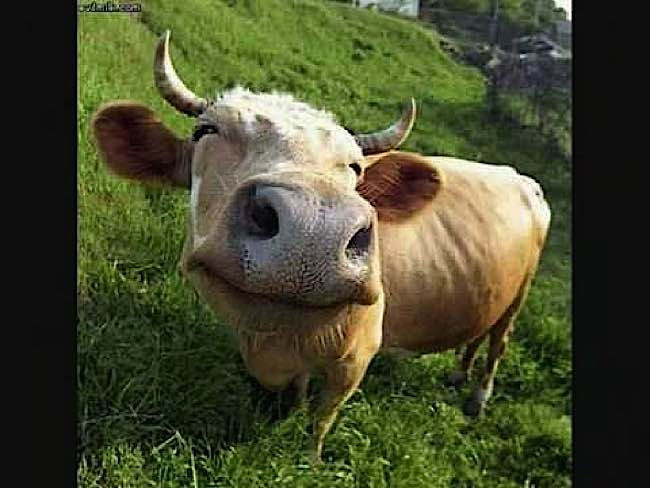
On one hand the Thais provide a good example of Buddhist Metta (kindness). They won’t kill stray or aging dogs. When these strays wander into temples where monks have little themselves, they find homes and food. On the other hand, this policy has led to hundreds of thousands of stray and starving dogs on the street. Yet, even the poorest of Thais try to feed these strays. According to Eric Beauchemin, “even poor people are trying to help these animals. Some of them go around on bicycles and feed up to a 100 dogs a day!”[2]
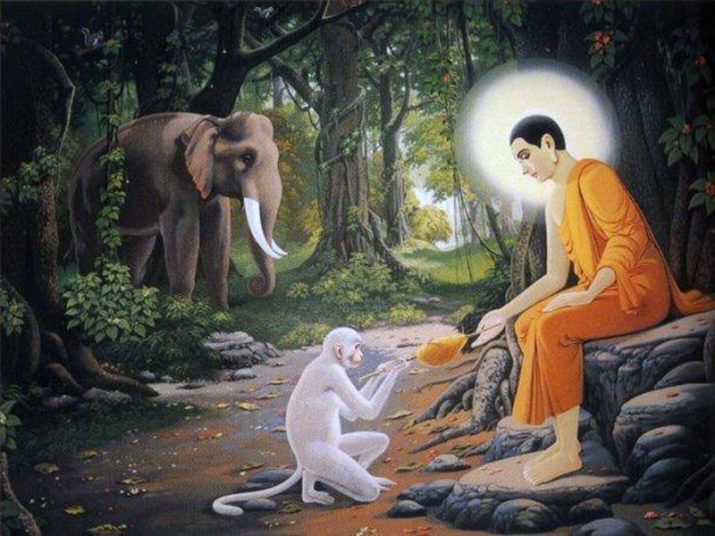
Dharma “all beings, all of whom have been our mothers”
It is inarguable that Buddha taught that animals are considered sentient beings. Dharma also clearly teaches that humans can be reborn as animals in future lives, just as animals can be reborn as humans. The Precepts also prohibit taking life, including animals.
Many Mahayana meditations, sadhanas and prayers use language such as “all beings, all of whom have been our mothers…” — a constant reminder that every being, even the insect we step on by accident, is potentially our family. Ultimately, Mahayana Buddhists accept that humans and animals are interconnected as a single family.
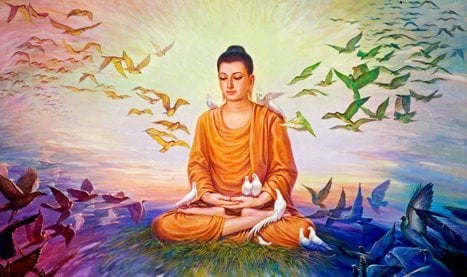
All this to say, your doggie, kitty, hamster, budgie and extended animal companions all have both Buddha Nature and karma. In what ways does this change our relationship to our beloved companions?
The Precepts prohibit taking of life — not just human life
While most religions prohibit the taking of human life, Buddhism goes much further. One of the most important precepts taught by Shakyamuni prohibited the taking of any life. There is a negative karmic implication in any deliberate killing — much less so in the case of an accidental killing. (In other words, if you accidentally step on an ant, this is not negative karma, but if you deliberately step on the ant, or set an ant trap, this is heavy negative karma. Needless to say, insect and rodent control must be highly skillful to avoid negative karma for a serious Buddhist — rodent proof containers and cleanliness replace traps and poison.)
Lama Zopa Rinpoche explained “that the vow of non-killing refers to abstaining from killing that is associated with and backed by ignorance and negative attachment. It is that kind of killing that creates negative karma. Only killing with a motivation that is “totally pure” becomes a virtue.” [4]
Eating animals
The prohibition on all killing one reason some Buddhists are vegetarian — although there is no precept prohibiting meat specifically. You are prohibited from killing for meat, but if you were given meat, in theory, you could eat it. However, if your demand for meat contributes to the slaughter of animals, it carries negative karma. A monk, for example, could accept donated meat, but the animal must not have been slaughtered specifically for the monk. Because of this precept, some strict Buddhist monks used to carry fly swishes to carefully whisk away insects without killing them.
This notion is not fanciful. In the Golden Light Sutra, Shakyamuni, in a past life as Prince Sattva, fed himself to a tigress and her babies so that they would not starve.
For less traditional Buddhists, secular Buddhists or “Buddhists without beliefs” rebirth is not necessarily accepted as fact — although karma certainly is — making Doggie Dharma a more straight-forward discussion. But, as it is certain that rebirth was taught by Buddha, most Buddhists accept the wider implications of animal Buddha Nature and the cycle of lower/higher rebirth.
NOTES
[1] “Is euthanizing pets advisable” by Venerable Thubten Chodron Jan 9, 2011
[2] “A Buddhist lesson in pet care” by Eric Becuchemin, Radio Netherlands, Feb 2006, The Buddhist Channel.
[3] “Buddhists offer blessing of animals: chanting, prayers greet pets for good health, better future” by Catherine Samose, Special to The Redding Pilot.
[4] “Euthanasia with a good heart” Lama Zopa Rinpoche, fpmt website.
[5] “Advice on Benefiting animals” Lama Zopa Rinpoche
[6] In response to Buddha Weekly request, answered on April 28, 2016. Theodore Tsaousidis is a teacher authorized by Zasep Tulku Rinpoche, who teaches with Medicine Buddha Toronto and Mindfulness Centre of Grey Bruce
[7] “Student Guidelines”, Zasep Tulku Rinpoche
Latest Features
Please support the "Spread the Dharma" mission as one of our heroic Dharma Supporting Members, or with a one-time donation.
Please Help Support the “Spread the Dharma” Mission!

Be a part of the noble mission as a supporting member or a patron, or a volunteer contributor of content.
The power of Dharma to help sentient beings, in part, lies in ensuring access to Buddha’s precious Dharma — the mission of Buddha Weekly. We can’t do it without you!
A non-profit association since 2007, Buddha Weekly published many feature articles, videos, and, podcasts. Please consider supporting the mission to preserve and “Spread the Dharma." Your support as either a patron or a supporting member helps defray the high costs of producing quality Dharma content. Thank you! Learn more here, or become one of our super karma heroes on Patreon.
Lee Kane
Author | Buddha Weekly
Lee Kane is the editor of Buddha Weekly, since 2007. His main focuses as a writer are mindfulness techniques, meditation, Dharma and Sutra commentaries, Buddhist practices, international perspectives and traditions, Vajrayana, Mahayana, Zen. He also covers various events.
Lee also contributes as a writer to various other online magazines and blogs.



